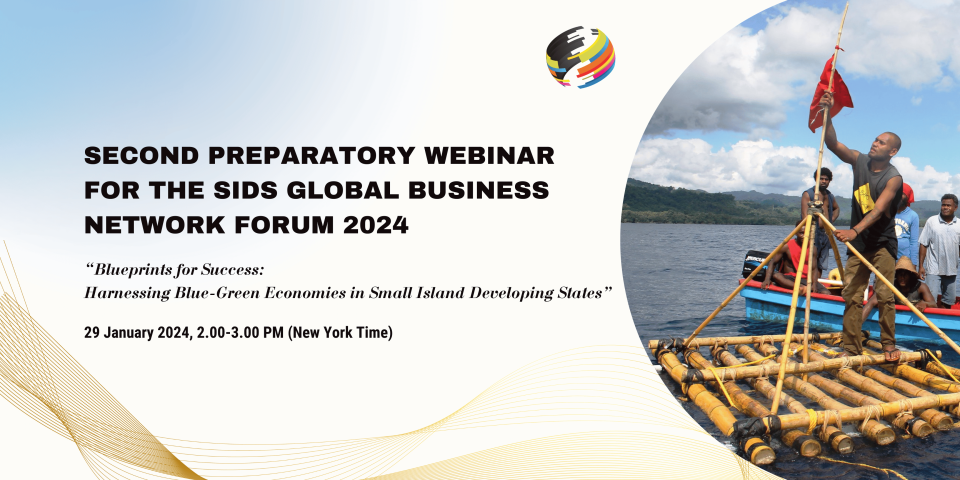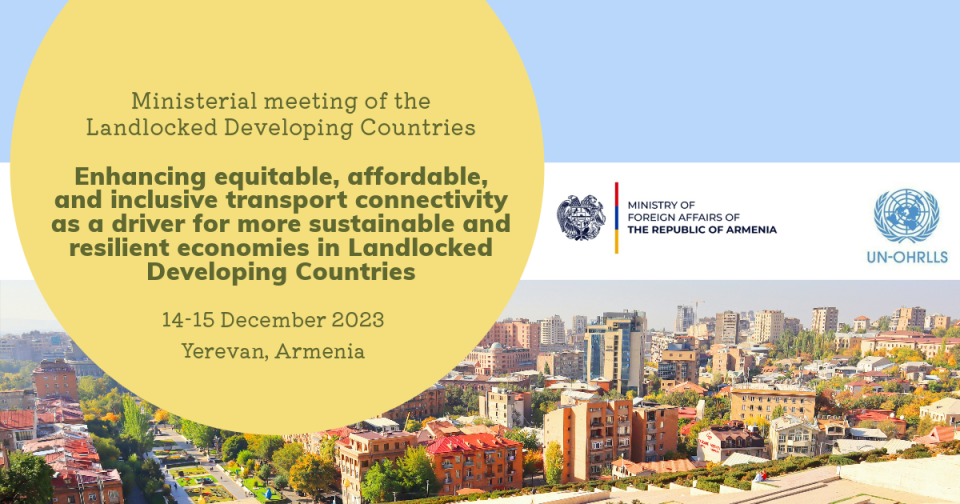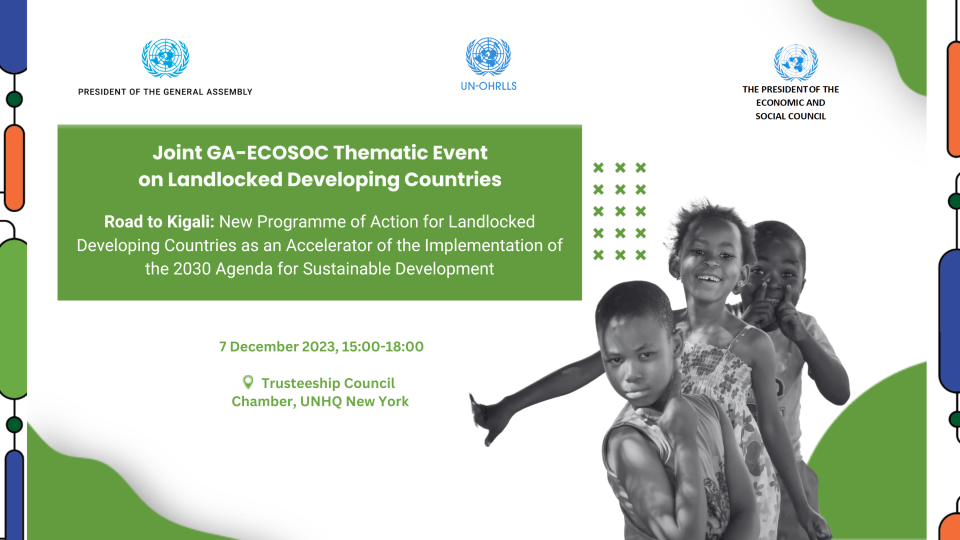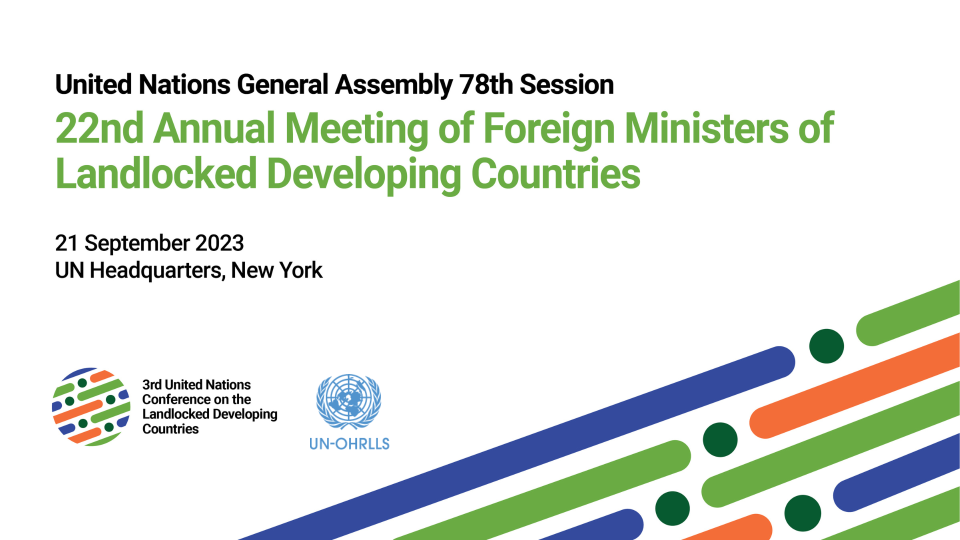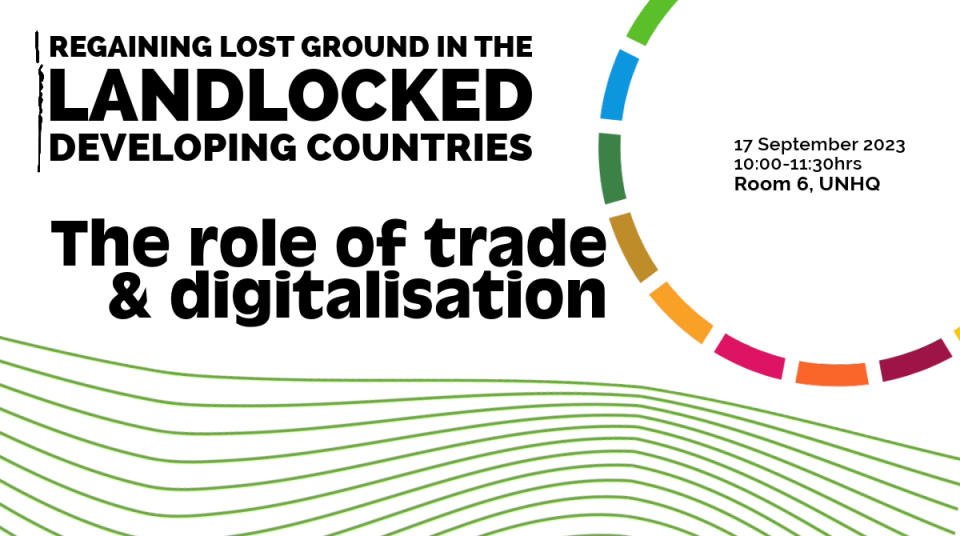Training Workshop for policymakers from LLDCs and transit countries on Strengthening capacity to design and implement policies and identify solutions that promote transport connectivity for the achievement of the SDGs
Virtual
30 September and 1 October 2021
INTRODUCTION
Improved transport connectivity is crucial for the achievement of the SDGs in LLDCs who because of their geography require an efficient transit transport system in order to effectively participate in global trade. Improving the transport connectivity of LLDCs requires development of both (i) the hard or the physical infrastructure, and (ii) the soft infrastructure or the necessary policies and regulatory frameworks.
The United Nations Office of the High Representative for the Least Developed Countries, Landlocked Developing Countries and the Small Island Developing States (UN-OHRLLS), in partnership with the UN Regional Commissions (ECA, ESCAP, ECLAC and ECE) and the African Development Bank and Asian Development Bank are implementing the project “Strengthening the capacity of Landlocked Developing Countries (LLDCs) to design and implement policies that promote transport connectivity in line with the Belt and Road Initiative for the achievement of the SDGs”. The project aims to help LLDCs and transit countries to develop capacity that can enable them to design policies to build hard and soft infrastructure that is key to improved connectivity to regional and global markets.
This training - Strengthening capacity to design and implement policies and identify solutions that promote transport connectivity for the achievement of the SDGs – is the second part of the training workshops being undertaken under the project.
The training will be held for Europe and Asia region on – 30 September and 1 October 2021.
OBJECTIVE OF THE TRAINING
The main objective of the training will be to enhance the capacity of policymakers from LLDCs and transit countries and equip them with knowledge and skills required to develop relevant policies to promote transport connectivity, promote development of climate resilient infrastructure and to respond to the impact of COVID-19 pandemic on transport connectivity. It will also focus on soft infrastructure issues such as how to strengthen national legal and regulatory frameworks on transit transport and in implementing relevant instruments, norms and standards on transport. It will also help them share experience and best practices on promoting transport connectivity.
FORMAT OF THE TRAINING
The training has modules and other background materials. The training will consist of presentation of the relevant topics by different resource persons using many case studies as much as possible. Participants will be given opportunities to share their experiences.
Languages – The training will have simultaneous interpretation - English; and Russian.
ACKNOWLEDGEMENT
The funding for the training was made possible through the project led by UN-OHRLLS entitled: Strengthening the capacity of Landlocked Developing Countries under the “Belt and Road Initiative” to design and implement policies that promote transport connectivity for the achievement of the SDGs which is funded by the 2030 Agenda for Sustainable Development Sub-Fund - United Nations Peace and Development Trust Fund.
BACKGROUND DOCUMENTS
- Concept Note
- Training Modules: English | Russian
- Global Report on Improving Transport Connectivity for LLDCs and Building of Resilient Transport Infrastructure to Support Accelerated Progress Towards the SDGs
- Vienna Programme of Action (VPoA)
- UNECE - Handbook for national master plans for freight transport and logistics
- UN-OHRLLS and International Think Tank for LLDCs 2021
- UNECE, 2020, Observatory on Border Crossings Status due to COVID-19
- UNECE 2021 - Intermodal Transport in the Age of COVID-19 Practices, Initiatives and Responses: Building pandemic-resilient transport systems
- UNESCAP, 2020, Policy Reponses to Covid-19: Transport Connectivity in Asia and the Pacific, Policy Brief
- UNESCAP, 2020b, Freight Transport and COVID-19 in North and Central Asia: Changing the Connectivity Paradigm, Prepared as a part of the ESCAP Framework on Socioeconomic response to COVID-19.
PRESENTATIONS
Opening Remarks
Session 1. Designing policies that promote transport connectivity for the achievement of the SDGs
- Towards the next regional action programme for sustainable transport development in Asia and the Pacific by Ms. Azhar Jaimurzina, Chief, Transport Connectivity and Logistics Section, Transport Division, United Nations Economic and Social Commission for Asia and the Pacific (UNESCAP)
- Key issues, by Ms. Fadiah Achmadi, Resource Person UN-OHRLLS
- Lessons and Experiences in data collection for monitoring corridors, by Mr. James Leather, Chief Transport Sector Group, Asian Development Bank
Session 2. Addressing Soft Infrastructure
- Overview and key issues by Ms. Fadiah Achmadi, Resource Person UN-OHRLLS
- Emerging Trends in Transit Transport Facilitation by Mr. Sandeep Raj Jain, Economic Affairs Officer, Transport Connectivity and Logistics Section, Transport Division, United Nations Economic and Social Commission for Asia and the Pacific (UNESCAP)
- Mr. Poul Hansen, Chief, Trade Facilitation, Division on Transport and Logistics, UNCTAD
Session 3. Sustainable and Resilient Transport Infrastructure
- Overview and key issues by Ms. Fadiah Achmadi, Resource Person UN-OHRLLS
- Sustainable freight transport by Ms. Frida Youssef, Chief, Transport Section, Division on Transport and Logistics, UNCTAD
- What UNECE and countries are doing to make the transport infrastructure resilient by Mr. Lukasz Wyrowski, Economic Affairs Officer, Sustainable Transport Division, United Nations Economic Commission for Europe
Session 4. Impact of COVID-19 on Transport Connectivity – Experiences, Lessons, Solutions
- Key issues by Ms. Fadiah Achmadi, Resource Person UN-OHRLLS
- Ms. Azhar Jaimurzina, Chief, Transport Connectivity and Logistics Section, Transport Division, United Nations Economic and Social Commission for Asia and the Pacific (UNESCAP)
- Country Experience by Mr. Emil Ahmadov, Leading adviser, Department of International Cooperation, Ministry of Transport, Communications and High Technologies, Azerbaijan
- Transport and Logistics situation of the LLDCs during the COVID-19 Pandemic: Case Mongolia, by Mr. Dulguun Damdin-Od, Director of Operation/Research Coordinator, International Think Tank for LLDCs
- Sub-region Experience by Mr. Traian Chebeleu, Deputy Secretary General, BSEC PERMIS
Session 5. Financing transport connectivity – Key issues (Re-cap)
- Overview and re-cap of key issues by Ms. Fadiah Achmadi, Resource Person UN-OHRLLS
- Briefing on the second United Nations Global Sustainable Transport Conference (14-16 October 2021) by Mr. Shantanu Mukherjee, Chief, Integrated Policy Analysis Branch, Division for Sustainable Development Goals, Department of Economic and Social Affairs (UN-DESA)
Closing – Ms. Heidi Schroderus-Fox, Director, UN-OHRLLS (video message)



